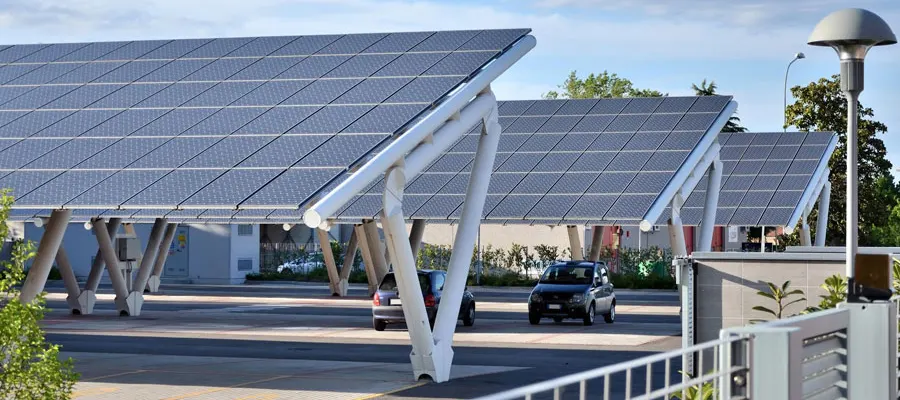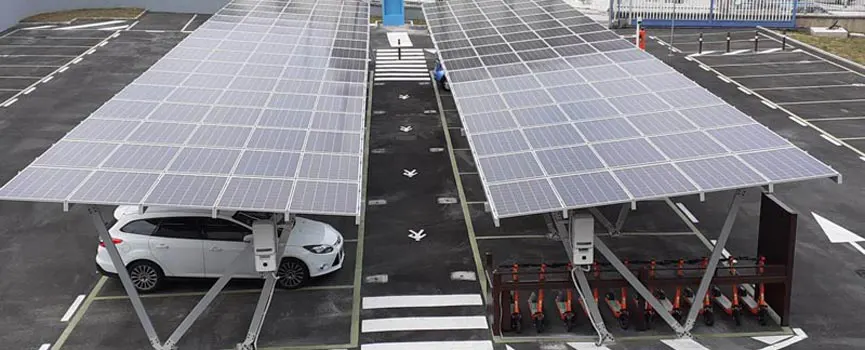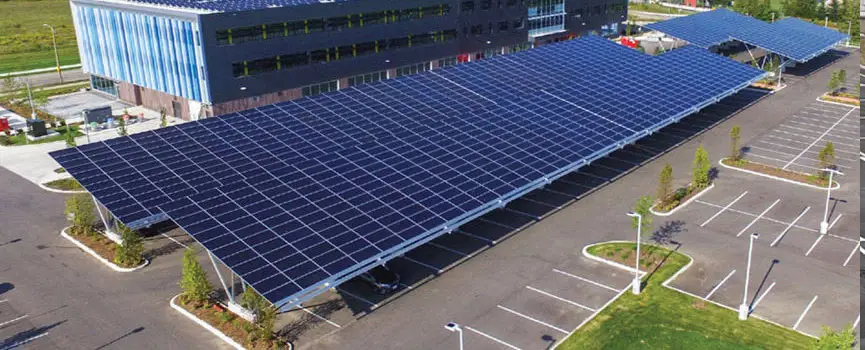- HOME
- ABOUT US
- SOLUTIONS
- Metal Roof PV Mounts and Systems
- Flat Roof Solar Panel Mounting Systems Solutions
- Tile Roof Solar Mounting Systems Solutions
- Solar Tracking Solutions for Commercial PV Projects
- Ground Solar Mounting Systems Solutions
- Floating Solar Solutions - PV Systems
- PV Solar Carport Mounting Systems Solutions
- Balcony Solar Panel Mounting Systems Solutions
- PRODUCTS
- PROJECTS
- COMPANY NEWS
- BLOG
- Contact Us

Solar carports are a type of carport that provides shade and protection for your vehicle. Solar carports have distinct advantages over both conventional carports and ground-mounted solar arrays.
In this article, we'll go over the pros and cons of solar carports, how they work, and how your clients can benefit.
What Is a Solar Carport?
A solar carport is a parking space canopy with solar panels attached to the top. Solar carports allow business owners to install solar panels over otherwise occupied parking lots because they are elevated structures (typically 14 feet or taller). Furthermore, they do not necessitate the acquisition of new land. And, unlike rooftop solar, which requires a building roof that is stable, strong, and meets a variety of other requirements, solar carports can be built in most open parking lots.
Imagine the energy that these unused areas could generate if solar carports were installed there. Solar carports also provide protection from UV light and precipitation, as well as convenient charging stations for EVs.
However, solar carports aren't just for charging electric vehicles. They can also supply energy to nearby businesses, homes, or the local utility grid. Solar carports generate the same amount of energy as standard roof-mounted solar power systems, if not more.
How Does a Solar Carport Work?
Solar carports collect sunlight and convert it into energy in the same way that other solar panel installations do, with the exception that the solar panels are located on top of the carport. The design of a solar carport differs from that of a traditional carport.
Solar carports function in the same way that rooftop or ground-mounted systems do: solar panels absorb photons from the sun and convert them into usable electrons, which are then sent to an inverter and converted to alternating current (AC) electricity for use on the grid. Solar carports truly shine in their multi-purpose nature, providing clean energy while also protecting your vehicle and saving space.
When compared to ground-mounted systems, solar carports provide a more efficient and unobtrusive way to collect energy from the sun. A solar carport is a great way to profit from clean energy in the most effective way possible if space is an issue for your home or business.
The Benefits Of Solar Carports

Regardless of their cost, residential and commercial solar panel carports have a number of advantages over rooftop and ground-mounted PV systems.
Effective Space Utilization
Because solar carports use a canopy system, they take up little to no extra space, making them an excellent alternative to rooftop and ground mount solar farms. They are installed on pre-existing parking lots, making them extremely space efficient. Solar carport systems can be installed on retail, commercial, industrial, or residential lots because they are so versatile and come in a variety of sizes.
Reduce Energy Expenses
Similar to flat roof solar systems and ground-mounted solar systems, solar carports reduce energy costs, resulting in substantial savings for businesses and homes. By lowering energy bills and making them more predictable, the solar carport can help protect against rising utility costs. A solar system can help to keep a company's cash flow stable. This may also present an opportunity to invest energy savings in different areas of the company/organization.
Protects Your Car from the Elements
Aside from the financial and environmental advantages, there is one very simple reason to install a solar carport: it will protect your vehicle from weather damage. A carport can be especially useful against inclement weather if you live in a snowy or rainy area.
Easy Electric Vehicle (EV) Charging
If you have an electric vehicle, you can make it even greener by charging it with solar panels. Your vehicle will not use any fossil fuels, which is great for the environment. Because your power source is only a few feet above your car, it's simple to connect an EV charger to the panels.
Simple to Maintain
In terms of service and weather issues, solar carports are much easier to maintain than you might think. Solar carports can direct rain and snow away from the cars, making it simpler to maintain a parking lot. It can also reduce the amount of ice on the lot, making navigation safer. If the solar panels ever require maintenance, they are very easy to access and do not require much effort to maintain.
Increases the value of your investment (ROI)
A solar carport installation has a payback period of five to fifteen years. There are also federal incentives, such as the solar tax credit, as well as state and local rebates and incentives to help offset some of your initial investment.
Furthermore, installing solar panels in general will improve the curb appeal of your home. If you intend to sell your home later, you can potentially increase its resale value. This increase in value is due in part to potential buyers not having to make additional investments to install a carport.
The Cons of Solar Carport

While having a solar carport can be beneficial in many ways, it may not be the best option for you for a number of reasons.
Building a New Structure
While you will save money on energy bills in the long run, installing a solar carport can be expensive at first. If you already have a carport, the pitch of the roof will most likely be insufficient to support solar panels, which must be angled in order to maximize the amount of power they harness from the sun.
Installation Cost
The initial cost of constructing a solar carport can range from $18,000 to $25,000. A non-solar carport will cost you between $4000 and $10,000. However, depending on how much you pay in electricity bills, you could easily make up the cost difference in two or three years.
Space Prerequisites
You'll also need to consider how much outdoor space your home has to accommodate a solar carport. To generate enough electricity to power a typical household, 400 to 700 square feet of solar panels are required. However, building a smaller solar carport is a good option for those without much space who are willing to cut their energy bills without eliminating them.
Solar Carport Cost
When you buy a solar carport system, you must also buy photovoltaic (PV) panels and a carport structure to support the panels. You'll also need to purchase the hardware wiring, various components, and labor to install your solar carport.
Residential Solar Carports
Rooftop solar installations are typically $2.81 per watt. However, you may be unable to use a residential rooftop solar system due to various rooftop restrictions. As a result, installing a solar carport will most likely cost around $4 per watt.
Commercial Solar Carports
Many companies will want to use solar carports for a variety of parking lot types, as this reduces their future electricity costs. Because businesses can purchase multiple solar carports, commercial installations typically cost around $3.45 per watt.
Contact Mibet Solar To Learn More About Solar Carports
Solar carports are a very viable and simple solution that can benefit anyone interested in going solar. They are simple structures that serve as a vehicle cover as well as a source of solar energy generation.
Mibet offers a wide range of rooftop and ground mount products for the residential, commercial, and utility scale markets. Now that you are aware of the benefits of installing a solar carport system, feel free to contact us today for more information on solar carport mounting systems and to receive a quote.

